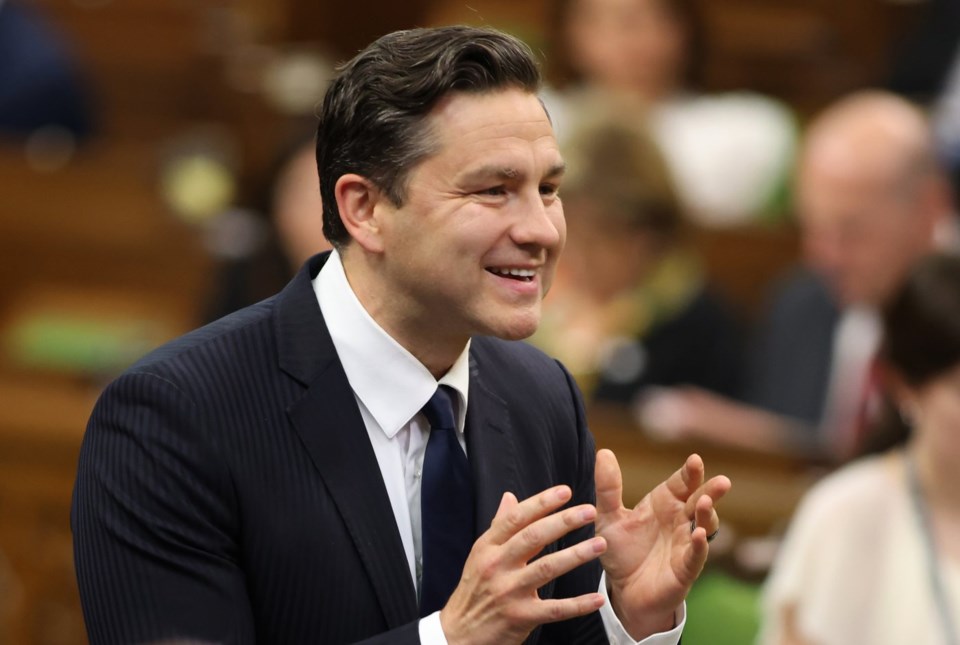OTTAWA — A future Conservative government would continue to support a ban on the use of replacement workers at federally regulated workplaces during a strike, leader Pierre Poilievre's office said Tuesday.
The legislation, which is on its way to becoming law after passing in the Senate late on Monday, was a key element of the Liberals' political pact with the New Democrats. The new rules will come into effect one year after the bill receives royal assent.
The bill earned unanimous support in the House of Commons after Poilievre's Conservatives decided to back it, waiting until the actual vote to state their position.
His office confirmed on Tuesday the ban on replacement workers in federally regulated workplaces will stay put if the Conservatives are the next party to form government.
"Common sense Conservatives supported Bill C-58, we continue to support it, and a future Conservative government will support it," spokesman Sebastian Skamski wrote in a statement.
"Pierre Poilievre is the only one listening and speaking to Canadian workers on shop floors and in union halls from coast to coast to coast and Conservatives are the only party that will bring home more powerful paycheques for workers."
Poilievre has been pitching the Tories as the best option for the working class, even though leaders of organized labour have been taking aim at his record in Parliament.
Bea Bruske, the president of the Canadian Labour Congress, used a meeting of union leaders back in April to call him a "fraud," cajoling attendees to "expose" Poilievre ahead of the next federal election.
In a statement on Tuesday, Bruske poured cold water on Poilievre's courtship of labour, noting that his MPs recently voted against the Sustainable Jobs Act and are opposed the government's increase to the capital gains inclusion rate — a revenue generator the Liberals are selling as a way to ask the wealthy to help pay for services and programs that benefit younger generations.
"I welcome the unanimous support for the anti-scab legislation but I'm going to fight like hell to build the same consensus behind other measures that would make life better for working people in Canada," she said.
Poilievre has tried turning the capital gains tax changes into a battle over tax increases, saying Liberals' decision to hold vote on the changes two months after announcing the move in the 2024 budget provided a window for the "richest Canadians" to sell their investments. The changes were always slated to take effect June 25.
Skamski on Tuesday blasted Trudeau for having "screwed over" workers with what he called "punishing taxes" and said NDP Leader Jagmeet Singh "sold them out" by striking a confidence-and-supply deal with the Liberals.
In a statement, NDP labour critic Matthew Green said Poilievre's public track record shows he voted against previous anti-scab bills eight times, adding that under the former Conservative government of Stephen Harper, Poilievre also supported increasing the age of retirement to 67, up from 65.
"No matter how often he says it and no matter how much he pretends, Pierre Poilievre is no friend of workers," Green said.
The Canadian Labour Congress and other union leaders often point out that Poilievre supported back-to-work legislation the last time the Conservatives were in power and at one point early in his political career he also advocated for employees to be allowed to opt out of unions.
The new "anti-scab" legislation has been lauded by union leaders as a win for workers' protections and bargaining power. It sets out a fine of up to $100,000 a day for employers who replace striking workers.
But the Canadian Chamber of Commerce warns small businesses and families that rely on essential services provided by federally regulated sectors could suffer as a result.
The government has agreed to bring the new law into effect in 12 months, down from the 18 months that was proposed earlier.
Labour Minister Seamus O'Regan has said labour mediators need time to prepare for the law to be implemented.
"This is a big, big moment," he told reporters before the Liberals' weekly cabinet meeting on Tuesday.
"This is such a fundamental change to the negotiations in the … federal private sector."
This report by The Canadian Press was first published June 18, 2024.
— With files from Laura Osman and Mia Rabson
Stephanie Taylor, The Canadian Press




